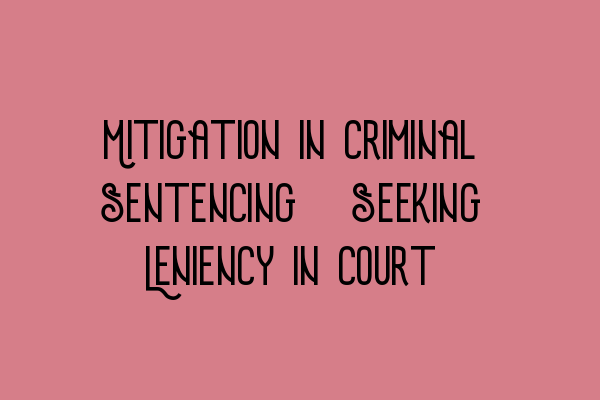Mitigation in Criminal Sentencing: Seeking Leniency in Court
When facing criminal charges, one of the key aspects that can greatly impact the outcome of the case is mitigation during sentencing. Mitigation refers to the process of presenting evidence or arguments to seek leniency from the court. It is an important opportunity to convince the judge to consider a less severe sentence.
Understanding how to effectively present mitigation in court requires knowledge of the legal framework and a strategic approach. At SQE Criminal Law & Practice Law UK, we provide comprehensive courses and resources to help aspiring solicitors navigate the complex world of criminal law and master the art of mitigation.
The Importance of Mitigation
When it comes to criminal sentencing, judges have discretion within certain legal boundaries. Mitigation provides an opportunity to highlight any factors that could potentially reduce the seriousness of the crime or show that the offender deserves a more lenient punishment.
Common factors considered during mitigation include:
- Remorse and rehabilitation
- Personal circumstances
- Previous good character
- Voluntary disclosure
- Cooperation with the authorities
- Compensation to the victim
- Any mental health or addiction issues
By presenting valid evidence and persuasive arguments regarding these factors, it is possible to sway the court to impose a more favorable sentence.
Strategies for Effective Mitigation
Effective mitigation in court requires careful preparation and presentation. Here are some strategies to enhance the chances of achieving a successful outcome:
- Thoroughly understand the legal framework: A solid understanding of the relevant sentencing guidelines and case laws is essential. This knowledge will enable you to identify potential areas where mitigation can be applied.
- Gather compelling evidence: Collect relevant documentation, witness statements, or expert opinions that support the mitigation arguments. This evidence should focus on the specific factors that could warrant a more lenient sentence.
- Present a coherent narrative: Craft a compelling story that highlights the mitigating factors in a clear and concise manner. Use persuasive language and structure your arguments logically to engage the judge and evoke empathy.
- Be respectful and sincere: Maintaining a professional and respectful tone throughout the mitigation presentation is crucial. Express genuine remorse and demonstrate a willingness to take responsibility for the actions committed.
- Address counterarguments: Anticipate potential counterarguments that the prosecution might raise and be prepared to refute them effectively. This will strengthen your case and undermine any opposing arguments.
- Seek legal advice: Consulting an experienced criminal solicitor can provide invaluable guidance and ensure that the mitigation strategy is comprehensive and tailored to the specific case.
At SQE Criminal Law & Practice Law UK, we offer top-quality courses designed to equip you with the necessary skills and knowledge to excel in the field of criminal law. Our expert tutors provide practical insights into the intricacies of mitigation, helping you build a solid foundation for your legal career.
Preparing for the SQE Exam
If you are aspiring to become a solicitor, passing the Solicitors Qualifying Examination (SQE) is an important milestone in your journey. At SQE Criminal Law & Practice Law UK, we offer comprehensive SQE preparation courses for both SQE 1 and SQE 2 exams.
To enhance your SQE 1 exam preparation, we recommend practicing with our SQE 1 Practice Exam Questions and taking our SQE 1 Practice Mocks FLK1 FLK2. These resources are designed to familiarize you with the exam format, assess your knowledge, and identify areas where you may need improvement.
For SQE 2 exam preparation, we provide comprehensive courses that cover all the major areas of law tested in the examination. Our experienced tutors will guide you through practical exercises, case studies, and mock scenarios, ensuring you are well-equipped to confidently tackle the challenges of the SQE 2 exam.
Stay ahead with our SRA SQE Exam Dates and start your journey towards a successful career in criminal law.
Conclusion
Mitigation plays a vital role in criminal sentencing, allowing individuals charged with offenses to seek leniency from the court. Understanding the intricacies of mitigation and mastering effective strategies can greatly impact the outcome of a case.
If you are embarking on a career in criminal law, our courses at SQE Criminal Law & Practice Law UK are designed to equip you with the knowledge and skills necessary to excel in the field. Don’t miss out on our comprehensive SQE 1 and SQE 2 preparation courses and resources.
For further assistance and guidance, feel free to contact us. Our team of expert tutors and legal professionals are ready to support you in your journey towards becoming a successful criminal solicitor.
